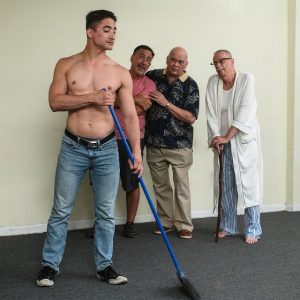DAMAGE CONTROL
Sometimes everything old is just — well — old again: The fourth entry in Pride Films and Plays’ five-show PAC Pride Fest, Hurricane Damage is a bittersweet world-premiere by New York playwright Kevin Brofsky that wants to engage us more than it does. A group portrait of two aging gay lovers, a long-separated friend, and a much-younger witness to the reunion, Brofsky’s two-hour character drama trudges rather than strolls down Memory Lane. But along that way it stumbles onto some sweet truths.
Looking backward to more than just the recent hurricane that has ravaged their seaside cottage on the Gulf Coast, Hurricane Damage is relentlessly retroactive. Paralyzed by a power outage in Dunedin, intrepid oldsters Oscar and Dennis get to dredge up 40-year-old gossip about a long-lost Gotham watering hole called High  Spirits. They recall guilty pleasures now turned to remorseful regrets, unearthing recollections of Connor, a lad they loved too well and lost too soon, and of the epidemic that still defines these survivors in exile.
Spirits. They recall guilty pleasures now turned to remorseful regrets, unearthing recollections of Connor, a lad they loved too well and lost too soon, and of the epidemic that still defines these survivors in exile.
Tested and testy after a third of a century’s devotion, the principal partners are triumphs of tough love. Oscar Grenville (Chicago favorite Danne W. Taylor), a grizzled and petulant old coot, is a cranky Yankee expat — and self-declared Scottish wallflower. He suddenly finds himself forced to deal with a lost cat and the ravages of a storm surge. Not quite completing Oscar but keeping things real is his help(less)mate Dennis Mason (Charles Berglund). This sporadically charming, ever irascible, curmudgeon hates everything about Florida from insects to the penis-shaped state’s complete cultural “blackout.” And sometimes he hates Oscar too.
But both agree on treasuring (perhaps too much) Ford Angel (a very fit Jesse Montoya), their 30-year-old live-in handyman. He’s a sweetie who, as this play totally requires, can listen well — and forgive too, after the utterly gratuitous, toxically nasty tongue-lashing he gets from Dennis near the end of the first act. Poor Ford, it seems, insufficiently appreciates Judy Garland. Almost as bad, he doesn’t know Isadora Duncan or recognize Mary Martin’s Peter Pan (even when Dennis “crows”). Inevitably, for Dennis, as Broadway baby, former drag queen, and failed “gypsy,” Ford’s lavender quotient is in negative numbers.
Presumably the sole homosexuals in their beach resort, O. and D. are in effect displaced persons: Which of them could have thought, back in the popper-sniffing glory days before the killing fields of AIDS, that “forever would be here”?
 Completing the quartet, and stirring up the past by invading their present, is long-time chum Norman Norwood (Tom Chiola), an un-transplanted New Yorker on a visit to the Treasure Coast. His arrival triggers in these orphans of the storm some industrial-strength nostalgia. It amounts to a lot of “summing up” or what an unkind observer might call a pity party for prisoners of their past.
Completing the quartet, and stirring up the past by invading their present, is long-time chum Norman Norwood (Tom Chiola), an un-transplanted New Yorker on a visit to the Treasure Coast. His arrival triggers in these orphans of the storm some industrial-strength nostalgia. It amounts to a lot of “summing up” or what an unkind observer might call a pity party for prisoners of their past.
Except that the second act delivers a kind of payoff amid the drama’s desultory inspection of snapshots from an uncompelling family album. In a long and moving monologue, Oscar tells Jesse what it was like to see AIDS destroy the post-Stonewall euphoria of disco madness. The speech is delicately mournful in its anguished depiction of a creeping illness that triggered homophobia along with lesions. Its sense of contagious loss is universal. Jesse — and the audience — take it in, deeper than expected.
Part of the continuum of sorrow is Oscar’s palpable pain over the loss of his beloved Pyewacket, a lovely, if unseen, feline who sought shelter from the hurricane but succumbed. This present calamity brings the quartet together as the shared stories that precede it cannot.
The play ends with a very questionable May-December romance, as well as a nude “photo opportunity” for Norman, and, for these “aged-in” lovers, the prospect of a late-blooming marriage when they return to New York City (where same-sex unions are suddenly possible). Though cursed with “20/20 hindsight,” Oscar and Dennis are not done with living or with love.
Despite having to deal with a rather boring first act, director Paul Cook is fine at orchestrating Brofsky’s predictable heartbreak. Even better, he keeps the script from marinating in too many memories. Overall Hurricane Damage is a strange amalgam of swan songs and smarmy patter, a gay Grey Gardens with enough humor to keep it from being its own exaggeration. But just barely, thanks to Pyewacket.
photos by Paul Goyette
Hurricane Damage
Pride Films and Plays
The Broadway, Pride Arts Center, 4139 N. Broadway
Wed & Fri at 7:30; Sat at 3; Sun at 5; Tues at 7:30 (Aug. 14 only)
ends on August 26, 2018
for tickets, call 773.857.0222 or visit Pride Films and Plays
for more shows, visit Theatre in Chicago




